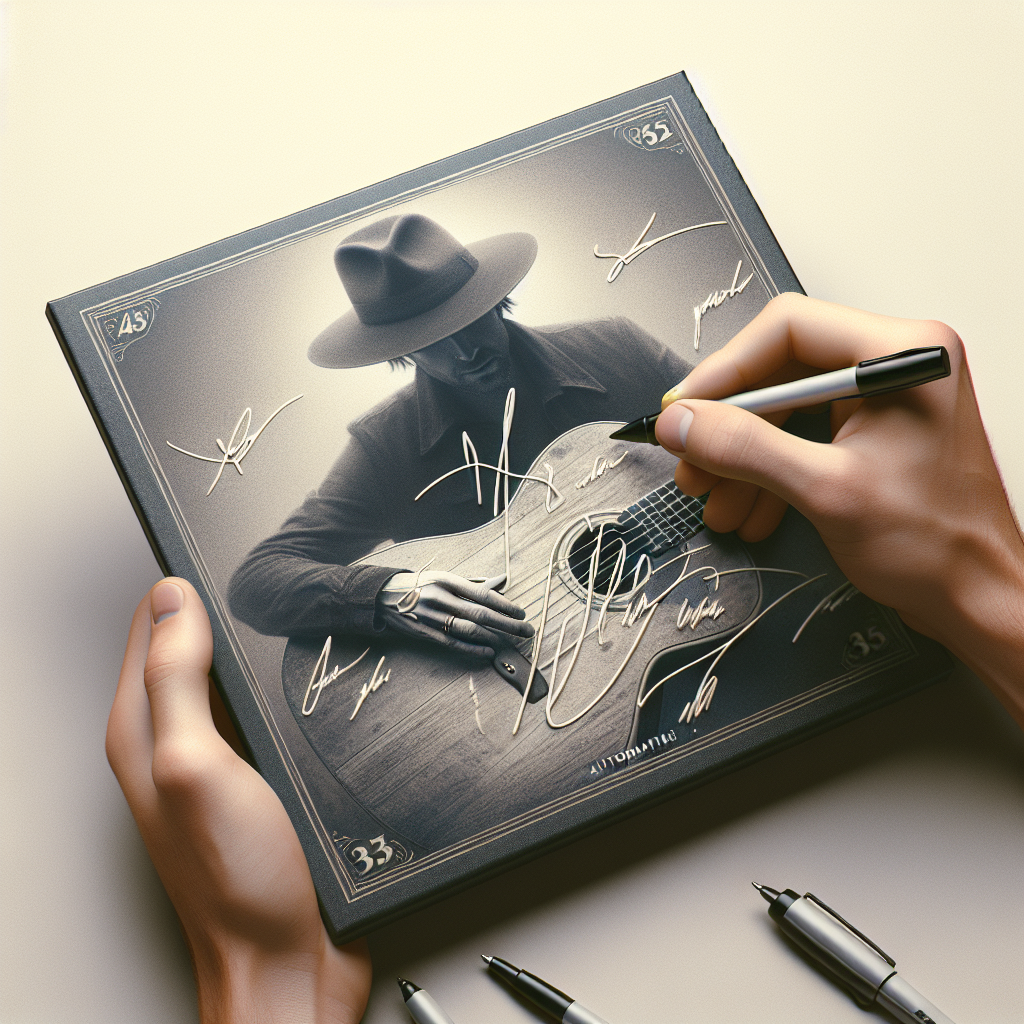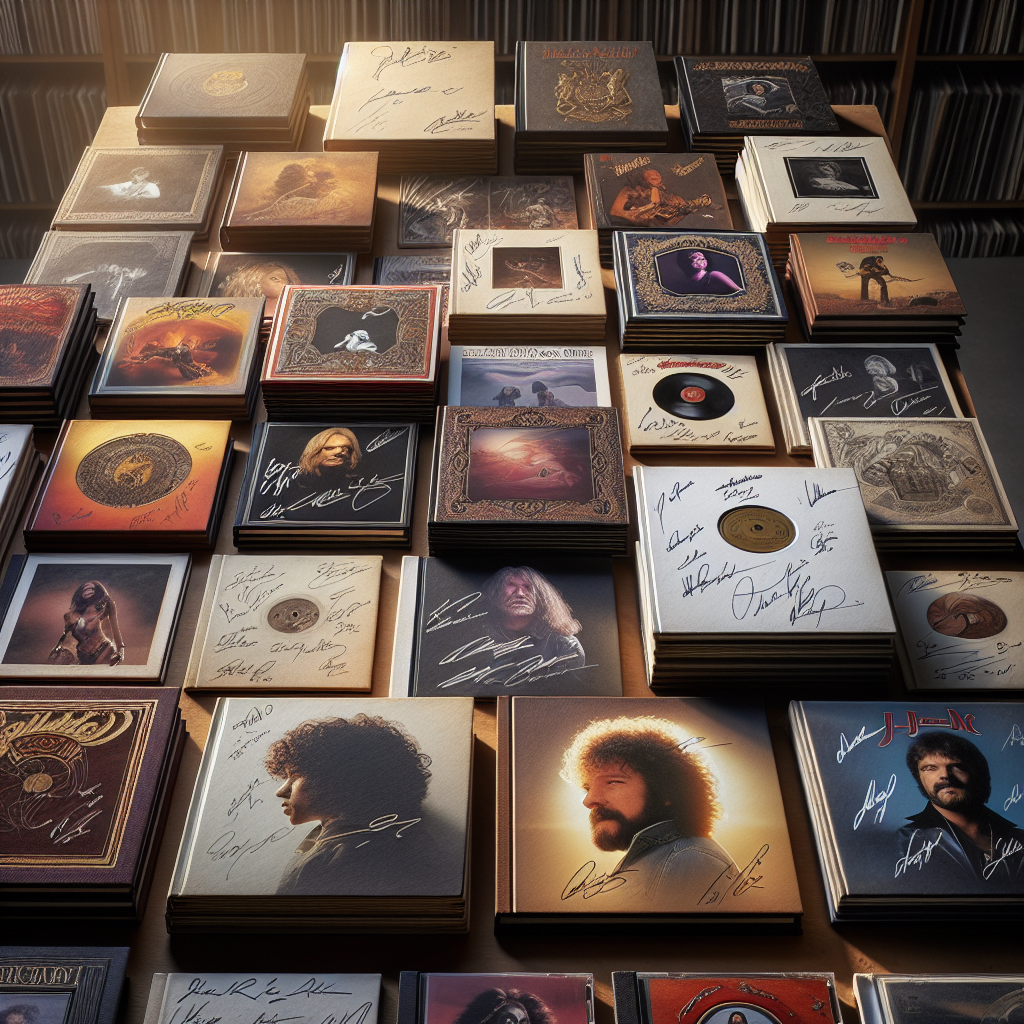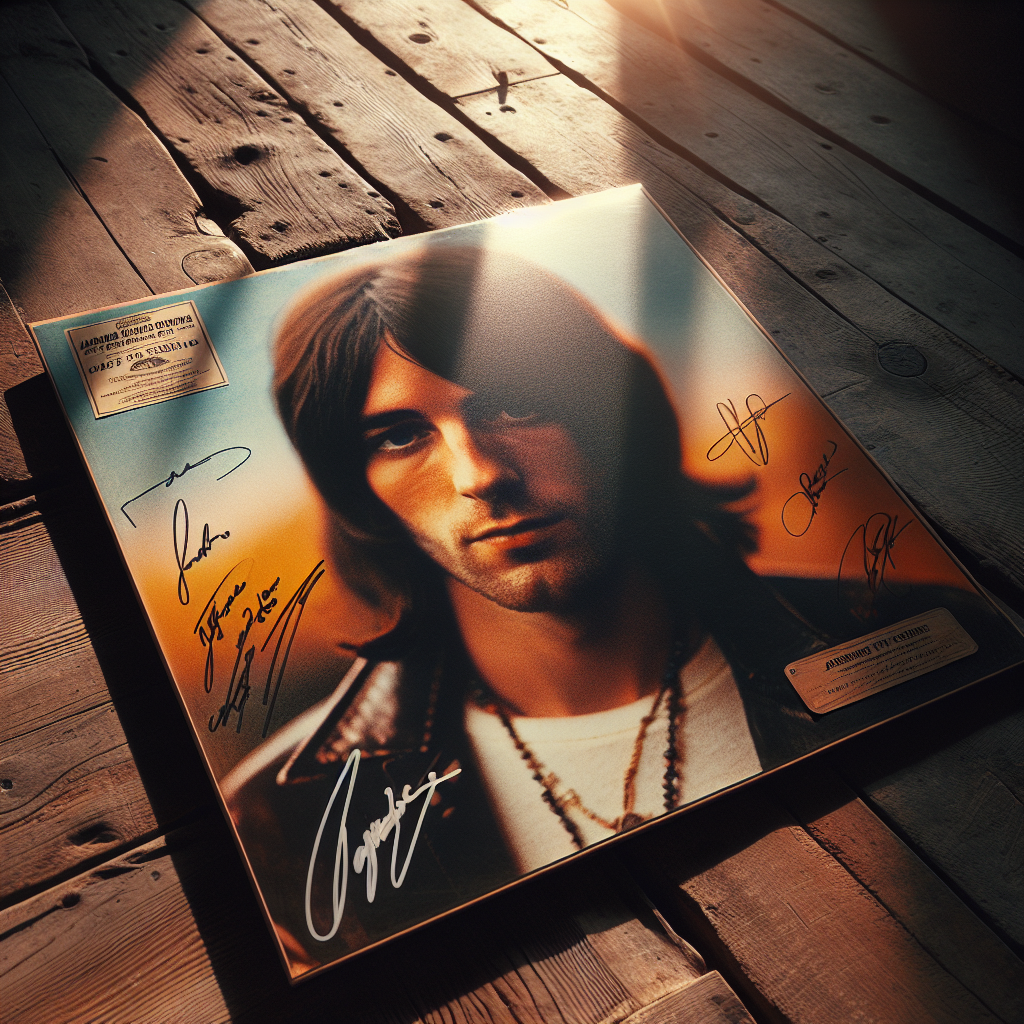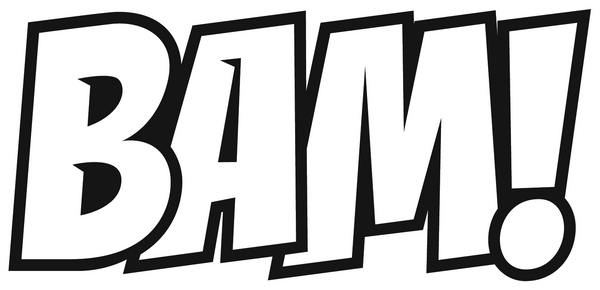Collecting autographed albums is a thrilling hobby, offering a tangible connection to your favorite artists and bands. However, in a market swarming with counterfeits, knowing how to find an authentic autographed album is crucial. This guide aims to arm you with the knowledge and tools to verify the legitimacy of autographed albums, so you can confidently build a collection that is both genuine and valuable.
Authenticity matters for several reasons. First, it ensures that your collection holds its value, both emotionally and financially. Second, it preserves the integrity of the music and the artists you admire. Lastly, having a genuine autograph can be a source of immense personal satisfaction.
It's easy to get overwhelmed by the sheer volume of fakes and forgeries out there. But don't worry! We’re here to help you navigate through the noise. With the right information, you can avoid scams and make informed decisions about your purchases.
Check out all of the different autographs available at bamautographs.com.
Understanding the Value of Authentic Autographs

Understanding the value of an authentic autographed album is essential for any serious collector. The worth of a signed album goes beyond its monetary value; it encapsulates a piece of music history, a personal connection to the artist, and a unique story. When an autograph is genuine, it can significantly enhance the album's value, making it a prized possession among fans and collectors alike.
Several factors influence the value of an authentic autograph:
- Rarity: The scarcity of an autograph can substantially drive up its value. Limited editions, out-of-print albums, or signatures from artists who rarely sign can command higher prices.
- Condition: The state of both the album and the autograph affects its value. Albums in mint condition with clear, legible signatures are more sought after compared to those with wear and tear or faded autographs.
- Provenance: Documented history of the autograph's origin adds credibility and value. Certificates of Authenticity (COAs) from reputable sources can provide assurance to buyers and collectors.
- Artist's Popularity: The fame and influence of the artist play a crucial role. Autographs from legendary or iconic musicians naturally hold more value compared to lesser-known artists.
When you understand these factors, you can make more informed decisions and appreciate the true worth of an authentic autographed album. This knowledge not only helps in building a valuable collection but also ensures that each piece holds a meaningful spot in your musical journey.
Researching the Seller and Provenance
Before making any purchase, it's crucial to thoroughly research the seller and the provenance of the authentic autographed album you're interested in. This due diligence can save you from potential scams and ensure you’re investing in a genuine piece.
Start by examining the seller's reputation. Look for reviews and ratings from previous buyers. Trusted platforms often have feedback systems where customers share their experiences. Pay attention to any red flags, such as numerous complaints about authenticity or poor customer service. Sellers with a strong track record of satisfied customers are more likely to be reliable.
Next, consider the provenance of the album. Provenance refers to the documented history of an item, tracing its ownership back to its origin. Authentic autographs usually come with a Certificate of Authenticity (COA) issued by a reputable third-party authentication service. These certificates add a layer of trust, verifying that the signature is genuine. However, even COAs can be forged, so it's essential to verify the credentials of the authentication service itself.
Additionally, ask the seller for any available documentation or stories behind the autograph. Sellers who are transparent about the item's history and ready to provide detailed information are generally more trustworthy. Be wary of sellers who are vague or reluctant to share details.
Finally, join online forums and communities of autograph collectors. Engaging with fellow enthusiasts can provide valuable insights and recommendations on trustworthy sellers and authentication services. These communities often share tips and experiences that can guide you in making informed decisions.
By meticulously researching the seller and the provenance, you can confidently invest in an authentic autographed album, ensuring its place as a valuable and cherished addition to your collection.
Identifying Authentic Signatures

Identifying authentic signatures can be a challenging yet rewarding aspect of collecting autographed albums. An authentic autographed album holds significant value, so it's essential to distinguish between genuine signatures and forgeries.
First, educate yourself about the signature styles of the artists you’re interested in. Every artist has unique characteristics in their handwriting, such as the flow, pressure, and distinctive marks or flourishes. Compare the signature on the album with known authentic examples. Look for consistency in these characteristics, but also be aware that slight variations can occur due to different signing conditions.
Next, examine the medium and placement of the signature. Authentic autographs are typically signed with permanent markers or pens that were common during the time the album was released. Be cautious of signatures that appear unusually faded or too pristine, as they could be signs of forgery. The placement of the autograph can also offer clues; genuine signatures are often placed in prominent or logical locations on the album cover.
Another vital aspect is the ink's age. Over time, ink on genuine autographs may show signs of aging, such as slight fading or discoloration. Fresh-looking ink on an old album could be a red flag. Additionally, use a magnifying glass to inspect the ink for uniformity and depth, as authentic signatures will often show variations in ink flow that are difficult to replicate.
Authentication services can also be invaluable in verifying signatures. These experts use advanced techniques and databases to determine the authenticity of autographs. While hiring a professional service involves extra cost, it can provide peace of mind, especially for high-value items.
In summary, combining knowledge of signature styles, careful inspection of the medium and placement, and possibly seeking professional authentication, you can enhance your ability to identify authentic signatures. This diligence ensures that your collection remains genuine and valuable.
Using Third-Party Authentication Services

When it comes to securing an authentic autographed album, using third-party authentication services can be an invaluable step. These services specialize in verifying the authenticity of autographs, giving collectors the peace of mind that comes with knowing their items are genuine.
Third-party authentication involves sending your album to a reputable authentication company, where experts will meticulously examine the signature. These professionals use a variety of techniques to assess authenticity, including comparing the autograph to known exemplars, analyzing ink and paper for age consistency, and using forensic tools to detect any signs of forgery.
Some of the most well-known authentication services include PSA/DNA, JSA (James Spence Authentication), and Beckett Authentication Services. These companies have built their reputations on their rigorous and thorough examination processes. When you submit an item for authentication, you'll typically receive a certificate of authenticity (COA) if the signature is deemed genuine. This COA can significantly enhance the value of your autographed album and make it more attractive to potential buyers.
It's important to choose a trustworthy authentication service. Do your research and seek recommendations from other collectors or reputable dealers. Avoid services that have a history of inaccuracies or that seem too good to be true in terms of pricing and turnaround times. Remember, a proper authentication process takes time and expertise.
Additionally, some authentication services offer grading, which assesses the overall condition of the autograph and the album. A high-grade authenticated autograph can command a higher price in the market. Combining authentication with grading can provide comprehensive documentation of your album's quality and authenticity.
Incorporating third-party authentication services into your collecting routine is a smart move. It not only protects your investment but also adds a level of credibility and assurance that is highly valued in the collector community.
Avoiding Common Scams and Pitfalls

In the pursuit of an authentic autographed album, being vigilant against scams and common pitfalls is crucial. The autograph industry, like many others, has its share of unscrupulous sellers who prey on unsuspecting collectors. Here are some tips to help you avoid falling victim to these scams.
First and foremost, always purchase from reputable sources. Established dealers and auction houses with positive reviews and a solid history in the industry are less likely to sell forgeries. When buying online, platforms like eBay or specialized collector forums often have buyer protections in place, but it's essential to check the seller's feedback and ask questions about the item's provenance.
One common scam to watch out for is the sale of 'preprinted' autographs. These are mass-produced items that feature a printed signature rather than a hand-signed one. They may look authentic at first glance but lack the unique characteristics of a genuine autograph. When in doubt, consult with an expert or use third-party authentication services to verify the autograph's authenticity.
Another pitfall is the 'too good to be true' deal. If the price of an autographed album seems exceptionally low, it might be fraudulent. Authentic, high-quality autographs come with a premium price tag due to their rarity and the demand among collectors. Skepticism is your friend in these situations; always double-check and verify before making a purchase.
Be wary of COAs that come from unknown or dubious sources. Scammers can easily create fake certificates to accompany forged items. Stick to COAs from well-known authentication companies like PSA/DNA, JSA, or Beckett. These organizations have rigorous standards and are widely trusted in the community.
Finally, educate yourself continuously. The more you know about the autographs you seek, the less likely you are to be deceived. Join collector groups, read up on the latest trends, and don't hesitate to seek advice from more experienced collectors.
By staying informed and cautious, you can avoid common scams and pitfalls, ensuring that your collection remains genuine and valuable. Check out all of the different autographs available at bamautographs.com.

